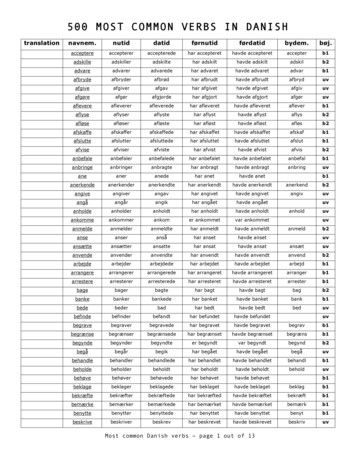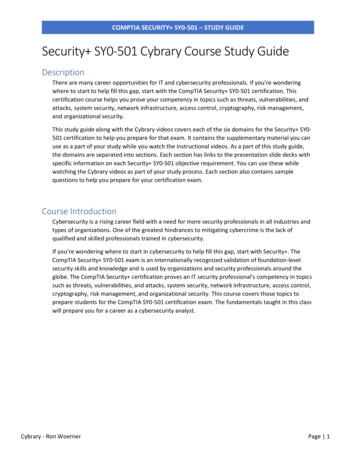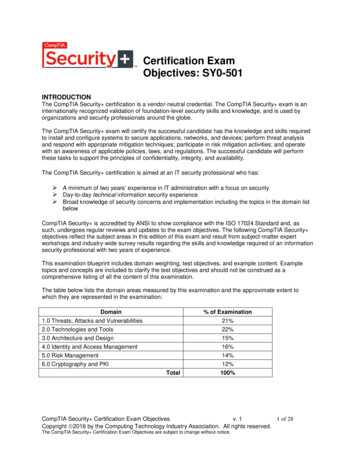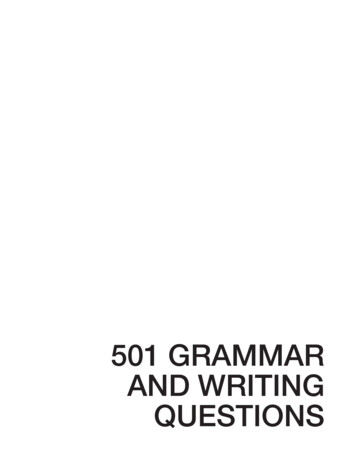
Transcription
7-9393-501GermVrbs-Fbs9/11/074:29 PMPage 1GERMANVERBS0BARRON’SGUFOREIGNL A N G UA G BAFORELANIGAGUGNEDGUIESLearning German Is Twice as Easy withThis Helpful 2-in-1 Combination!The easy-to-use reference book gives you:The bonus CD-ROM gives you: Sentence completion exercises—fill in the correct word Dialogue exercises—fill in the appropriate response Word completion exercises—find the correct verb form Word seek exercises—find the right word to fit the phrase Matching with English—find correct translations in theright-hand column Answers given for all exercisesISBN-13: 978-0-7641-9393-4ISBN-10: 0-7641-9393-7EANBRAND-NEWEDITION OFBARRON’SBEST-SELLING501 VERBSSERIES 16.99 Canada 19.99GERMAN VERBS The most common German verbs, alphabetically arranged, one verb per page,conjugated in all tenses Common idioms and example sentences demonstrating verb usage Index of German verb forms identified by their infinitive A summary of sequence of verb tenses . . . and much moreGERMANVERBS0FOURTH EDITIONFully conjugated in all the tensesin an easy-to-learn formatalphabetically arrangedHenry StrutzEE MRF ROECD SIDINwithTHE BEST-SELLING VERB SERIES IN THE WORLDw w w.b a r r o n se d u c.co mCD-ROM
7 9393 501German FM18/28/073:31 PMPage iS’NORRBAFORELANIGAGUGNEDEIUGGERMANVERBS0FOURTH EDITIONFully conjugated in all the tenses in a new,easy-to-learn format, alphabetically arrangedbyHenry StrutzFormerly Associate Professor of LanguagesS.U.N.Y., Agricultural and Technical CollegeAlfred, New YorkS
7 9393 501German FM18/28/073:31 PMPage ii Copyright 2008, 1998 by Barron’s Educational Series, Inc.Prior editions Copyright 1990, 1972 by Barron’s Educational Series, Inc.All rights reserved.No part of this book may be reproduced in anyform, by photostat, microfilm, xerography, or anyother means, or incorporated into any informationretrieval system, electronic or mechanical, withoutthe written permission of the copyright owner.All inquiries should be addressed to:Barron’s Educational Series, Inc.250 Wireless BoulevardHauppauge, New York 11788www.barronseduc.comISBN-13: 978-0-7641-9393-4ISBN-10: 0-7641-9393-7Library of Congress Catalog Card No. 2007011978Library of Congress Cataloging-in-Publication DataStrutz, Henry.501 German verbs : fully conjugated in all the tenses in a new, easy-to-learnformat, alphabetically arranged / by Henry Strutz. — 4th ed.p. cm. (Barron’s foreign language guides)Includes index.ISBN-13: 978-0-7641-9393-4 (alk. paper)ISBN-10: 0-7641-9393-7 (alk. paper)1. German language—Verb—Tables. I. Title. II. Title: Five hundred oneGerman verbs.PF3271.S855 2008438.2'421—dc22PRINTED IN CANADA9 8 7 6 5 4 3 2 12007011978
7 9393 501German FM18/28/073:31 PMPage iiiContentsForewordPronunciationTenses and Moods in German, with English EquivalentsSample English Verb ConjugationSample German Verb ConjugationSample English Verb Conjugation—Passive VoiceSample German Verb Conjugation—Passive VoiceWeak and Strong VerbsSpecial Verb UsesSome Pointers on the Use of TensesThe Subjunctive MoodVerbs with a Dative ObjectSubject Pronouns and Verb Forms in the Imperative MoodEssential 55 Verb ListAlphabetical Listing of 501 German Verbs Fully Conjugatedin All the TensesAppendixesPrefix VerbsWord OrderVerb Drills and Tests with Answers ExplainedWeather Expressions and Impersonal VerbsProverbs and Idiomatic ExpressionsEnglish-German Verb IndexGerman-English Verb IndexIndex of Verb Forms Identified by 7680686692
7 9393 501German FM18/28/073:31 PMPage ivForewordThe verb is a very important part of speech; it denotes action or state of being.The noted American historian and poet, Carl Sandburg, once declared that theCivil War was fought over a verb, namely, whether it was correct to say “TheUnited States is” or “The United States are.”For each of the 501 verbs listed in this book, the student will find the principalparts of each verb at the top of the page. The principal parts consist of:1.2.3.4.the Infinitivethe third person singular of the Past Tensethe Past Participle (preceded by ist for sein verbs)the third person singular of the Present TenseEXAMPLE:ENGLISH: to speak, spoke, spoken, speaksGERMAN: sprechen, sprach, gesprochen, sprichtThese are the basic forms of the verb and should be memorized, especially inthe case of the irregular or strong verbs, that is verbs which change the stemvowel of the Infinitive to form the Past Tense and whose Past Participle ends inen. More than one-half of the verbs in this book are strong or irregular verbs.Weak or regular verbs do not change the stem vowel of the Infinitive to formthe Past Tense but merely add the ending te (plus personal endings in the secondperson singular and the three persons of the plural). Past Participles of weakverbs end in t.EXAMPLE:ENGLISH: to play, played, played, playsGERMAN: spielen, spielte, gespielt, spieltBoth English and German have strong and weak verbs.With the exception of a small group of verbs called irregular weak verbs (insome texts called mixed verbs or “hybrids”—see index), verbs in German areeither weak or strong. The strong or irregular verbs are not as difficult to learn asit might seem, if it is remembered that most of them can be classified into sevenmajor groups. For example, the verbs bleiben, leihen, meiden, preisen, reiben,scheiden, scheinen, schreien, schweigen, steigen, treiben, verzeihen, weisenall follow the same pattern as schreiben in their principal parts:schreiben, schrieb, geschrieben, schreibtThere are six other major groupings (the “Ablautsreihen”) of the strong verbswith which you should familiarize yourself. You will then agree that the Englishauthor, H. H. Munro (Saki), exaggerated the difficulty of German verbs when, inhis story “Tobermory,” he told of a professor who had to flee England after a cat,which he had trained to talk, compromised the weekend guests at an Englishmanor house by revealing their secrets which it (the cat) had overheard. A fewweeks thereafter, the newspapers reported that the professor had been found deadin the Dresden Zoo in Germany. Upon hearing this news, one of the guests, whohad been embarrassed by the activities of the professor and his remarkable cat,iv
7 9393 501German FM18/28/073:31 PMPage vcommented that it served the professor right if he was trying to teach the pooranimals those horrible German irregular verbs.Below the principal parts, you will find the Imperative or Command Form.Since there are three ways of saying you in German (du, ihr, and Sie), there arethus three ways of giving commands to people. The first form of the Imperative isthe du or familiar singular form which ends in e in most cases, although this e isfrequently dropped in colloquial speech. The second form is the ihr or FamiliarPlural Imperative. It is exactly the same as the ihr form (second person plural) ofthe Present Tense. The polite or Sie Imperative (called in some texts theConventional or Formal Imperative) is simply the infinitive plus Sie, except forthe imperative of sein, which is seien Sie!The fully conjugated forms of the six tenses of the Indicative will be found onthe left-hand side of each page. These six tenses state a fact, or, in their interrogative (question) form, ask a question about a fact. You should refer to a grammarfor more detailed information concerning the use of these tenses: the idiomaticuse of the Present for the Future; the use of the Present Perfect in colloquialspeech and in non-connected narratives where English uses the past; the Futureand Future Perfect used idiomatically to express probability; the very importantmatter of sein and intransitive verbs. See also “Special Verb Uses,” page 15.The right-hand side of each page is devoted to the tenses of the Subjunctivemood, which is used to denote unreality, possibility, doubt in the mind of thespeaker. For information concerning the use of the Subjunctive (indirect discourse;the use of the Past Subjunctive or Present Subjunctive II for the Conditional), youshould also consult a grammar and “The Subjunctive Mood,” page 24.There are four “Times” in the Subjunctive: Present, Past, Future, and FuturePerfect time. Each of the “Times” has a primary and secondary form (indicatedby I and II in many grammars). This more recent classification of the forms of theSubjunctive corresponds better to its actual use. However, since some grammarsstill use the traditional names for the tenses of the Subjunctive (which parallel thenames for the tenses of the Indicative), they have been given in parentheses. Theform ginge, for example, may be called the Imperfect or Past Subjunctive ofgehen in some books. In most grammars published today, however, it will becalled the Present Subjunctive Secondary (II) or General Subjunctive. The studentwill find ginge listed in this book under Subjunctive, Present Time, Secondary.The alternate designation Imperfect Subjunctive is also given in parentheses.The Present Participle of the verb (that is, dancing dolls, flying saucers, singingdogs) has been omitted, since in almost all cases it merely adds a d to the infinitive. The student should remember that the Present Participle is used only adjectivally (as in the above examples) or adverbially. Verbal nouns are expressed inGerman by the infinitive: das Tanzen—dancing; das Fliegen—flying; dasSingen—singing.German verbs can often be combined with prefixes. The matter of prefixes isof great importance. The index therefore devotes considerable attention to them,although, of necessity, it is by no means complete in its listings of verbs whichcan be combined with prefixes. There are three groups of prefixes: the separable,inseparable, and doubtful prefixes.v
7 9393 501German FM18/28/073:31 PMPage viThis new edition of 501 GERMAN VERBS has many features that should bevery useful to you in studying German. The new sections “Prefix Verbs” (page609) and “Word Order” (page 612) will help you to understand and master difficult areas. In addition, you now have a 55-page practice section (“Verb Drills andTests with Answers Explained,” page 614) that provides hands-on instruction incorrect verb usage.This new edition features a listing of 55 essential verbs. For many of thoseverbs, a sampling of major related prefix verbs is also given, along with sentences illustrating their meaning. Separable prefix verbs are listed first, followedby inseparable prefix verbs. A few verbs have a separable and an inseparableprefix verb that are written similarly, though pronounced differently. See the discussion of doubtful prefixes on page 610. Understanding prefix verbs, their relationship to the main verb, and formal differences in using them is a difficult yetextremely important topic in studying German and essential for vocabularybuilding. Prefixes often express shades of meaning of the basic verb and canmake that meaning more precise. In addition to those cited, many other verbshave prefix verbs related to them. By studying the examples given, you will gaininsight into how prefix verbs work in general.Because this book is a quick reference source for the completely conjugatedforms of German verbs, it should assist you considerably in learning and usingGerman verbs.Henry Strutzvi
7 9393 501German FM18/28/073:31 PMPage 1PronunciationAnyone unfamiliar with both English and German would find German pronunciation easier. Once the basic German sound system is learned, there are few problems, since, unlike English, German is spoken as it is written. There are fewdeviations from specific sound values.Long and Short VowelsAn unstressed e usually in the last syllable of a word, is always pronounced, as inkomme, Rose, Lampe. In verb forms like the first person singular of the presenttense, the e is often dropped in colloquial speech. Both ich komme and ichkomm are possible. The e in inseparable prefixes (be, emp, ent, er, ge, miss,ver, zer) and in the combiantions of el, eln, en, er, et at the end of a word isunstressed and always short.EXAMPLES:begonnen, verrechnet, Bremen, Regel, LehrerAs a general rule, a vowel is long if it is:1. doubled (Seele, Beethoven, Boot),2. followed by an “h” (Mahler, Brahms, Ohm),3. followed by a single consonant (Schumann, Not, Ton)LONG VOWELSAPPROXIMATE ENGLISHEQUIVALENTSEXAMPLESaei or ieoualms, gods, ah, balmeight, great, gatebee, beaver, eagle, gleeso, boat, glow, roadboom, bloom, womb, tombbaden, Wahnehren, ewigWien, lieben, wirRose, Ton, Mohnruhen, rufenDIPHTHONGSAPPROXIMATE ENGLISHEQUIVALENTSEXAMPLESauei, aieu, äuchow, house, town, bowkite, bright, white, lightfoil, joint, toil, toyMaus, braunWein, mein, Kaiserfreuen, streuen, HäuserLONGUMLAUTEDVOWELSAPPROXIMATE ENGLISHEQUIVALENTSEXAMPLESäöüpale, sacred, grailearly, bird, worm, her(with lips forward and rounded)cream, treat, feel(with lips forward and rounded)Ähre, Mährenöd, öl, hörenfühlen, für, trübPronunciation1
7 9393 501German FM18/28/073:31 PMPage 2SHORT VOWELSAPPROXIMATE ENGLISHEQUIVALENTSEXAMPLESaeioupond, wand, lotlet, help, getbring, fish, winlove, sub, bloodbush, good, fullalt, Apfel, Anfangvergessen, Brett, Netzich, will, FischLoch, noch, trotzBusch, Butter, KussSHORTUMLAUTEDVOWELSAPPROXIMATE ENGLISHEQUIVALENTSEXAMPLESäöwhen, men, tengirl, hurl, twirl(with lips forward and rounded)wish, pin, thin(with lips forward and rounded)üHändel, Äpfel, BäckerHölle, Köchin, GötterKüsschen, Schüssel,wünschen, Sünde, dünnConsonantsLETTERSSOUND IN ENGLISHEXAMPLESbb (as in English boy)p (between vowel and consonantor at end of word, as in map)ts (before e, i, ö, and ä, as in wits)k (as in cold)kh (strongly aspirated, breathysound, as in hula-hula or Hugh)k (as in king, locks, box)d (as in dollar)t (between vowel and consonantand at end of word, as in cat)g (as in gods)k (at end of word, as in back)h (as in hand)not sounded between two vowelssounded like ich in North Germanpronunciationy (as in year)kv (as in kvass, a fermen
in an easy-to-learn format alphabetically arranged 0 CD-ROM FREE INSIDE GERMAN VERBS BRAND-NEW EDITION OF BARRON’S BEST-SELLING 501 VERBS SERIES THE BEST-SELLING VERB SERIES IN THE WORLD Learning German Is Twice as Easy with This Helpful 2-in-1 Combination! Henry Strutz Strutz ISBN-13: 978-0-7641-9393-4 EAN 16.99 Canada 19.99 www.barronseduc.com ISBN











